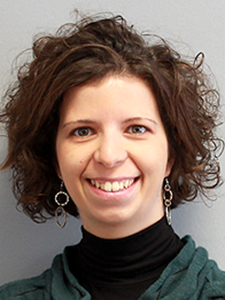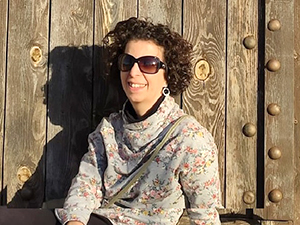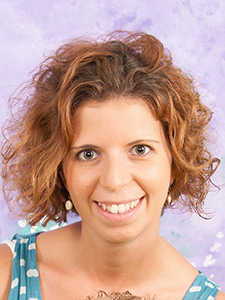- Who We Are
- Updates & News
- Standards
- Software Tools
- Network Studies
- Community Forums
- Education
- New To OHDSI?
- Community Calls
- Past Events
- Workgroups
- Tutorials
- 2025 ‘Our Journey’ Annual Report
- Current Events
- Support & Sponsorship
- 2025 Global Symposium
- 2025 APAC Symposium
- 2026 Global Symposium
- Github
- YouTube
- X/Twitter
- Newsletters
Collaborator Spotlight: Montse Camprubi
Montse Camprubi works at Synapse Research Management Partners. She has wide experience in managing and coordinating complex research projects as well as acting as community manager, including the development of internal communication mechanisms to promote communication dynamics. Montse is highly skilled in EU funded projects with deep knowledge on financing and control resource procedures.
Currently the EHDEN community manager, she is leading the central coordination efforts between EHDEN Data Partners and certified SMES and EHDEN experts.
In the latest edition of the collaborator spotlight, Montse discusses her background and career journey, recent highlights and future plans in EHDEN, the upcoming OHDSI Europe Symposium, and plenty more!

Can you discuss your background and career journey?
My career started with a University degree in Translation. Soon after securing my license I was offered a position in a new department at the University Foundation aimed at managing European-funded projects. This turned out to be the start of my career in project management almost twenty years ago (amazing to see how much time has already passed!). My initial projects were in Information and Communications Technology (ICT) and then my focus shifted more to biomedical projects in 2009. In 2012, I joined Synapse Research Management Partners, where I’m currently working. Here I’ve been able to sharpen my management skills in many different ways – thanks to a dream team of professionals!
Since you serve as community manager for EHDEN, can you share some of the highlights from EHDEN over the last year?
The EHDEN project started in late 2018, and the first open calls for data partners were kicked off in the second half of 2019 after carefully designing the process and the required associated documentation and systems for its implementation. In early 2020, we then launched the rapid call on COVID, which helped raise awareness and interest in generating real world evidence. Early on in the project we realised that we needed to create a dedicated role that would monitor the progress in the ETL transformation of the selected data partners. I’m very pleased to say that I took over this position acting as the central point of contact between data partners and EHDEN members in all the phases of the process (from contractual and financial – to the implementation of their mapping).
One of the major accomplishments over the last year has been all the activities around evidence generation, with several studyathons organised. These have proven to be very informative activities for the participating data partners, many of whom were sharing standardised data for the first time. Some of the publications stemming from these studyathons are either being finalised or are already being published.
 EHDEN is reaching the conclusion of its original IMI 2 Phase, so can you share details of the EHDEN Foundation and how it can continue the progress in a sustainable way?
EHDEN is reaching the conclusion of its original IMI 2 Phase, so can you share details of the EHDEN Foundation and how it can continue the progress in a sustainable way?
EHDEN is very proud of the creation of the EHDEN Foundation. We are currently in a transition period, in which the EHDEN Foundation is now working in pilot mode testing all established processes, and engaging with data partners, so that it can implement EHDEN’s operating post-project. We envisage it will continue growing the open science community with data partners, SMEs and researchers, that it will build on the EHDEN’s successes, and deliver a new paradigm for the analysis of health data.
Can you talk about where the EHDEN network of data partners currently stands and lessons learned throughout the journey on creating such a vast network?
After seven open calls, with close to 200 data partners in our network (who received grants to map their data to OMOP), we can now say that we are about to close all grants with less than only a dozen data partners who still need to finalise their mapping. This is a great and unique achievement, and as the community manager, I really must congratulate all data partners for their efforts and commitment and thank all members in EHDEN who have contributed from many different fronts.
One of the exciting developments last year was the creation of National Nodes across Europe. How is that going, and what has been the early impact from those Nodes?
Although the National Nodes are an initiative linked to OHDSI, we can definitely say that EHDEN has contributed significantly to the expansion of National Nodes, which underscores the strong connection between the two initiatives. The National Nodes have a direct impact on the participating data partners, as they benefit from sharing best practices and can avoid common hurdles in the process. The participating certified SMEs also play an important position in the Nodes, even a leading position in some cases. We’re sure that a few more National Nodes will still be created this year or next year.
 Work is already happening for the 2024 Europe Symposium. How important is it to not only highlight the progress happening across the regions, but to also create new collaborations across Europe?
Work is already happening for the 2024 Europe Symposium. How important is it to not only highlight the progress happening across the regions, but to also create new collaborations across Europe?
It’s very important! Science can evolve infinitely faster and more effectively through multiple collaborations and expanding networks. The OHDSI Europe Symposium is a great example of this, where at last year’s meeting the attendance of new members grew by almost 50%. I’m eager to attend this year’s Symposium and to meet all existing and new members of our community.
What are some of your hobbies, and what is one interesting thing that most community members might not know about you?
In my spare time, which is not much, I love sewing. The feeling of creating something from scratch that my kids or I can wear keeps surprising me. Sewing, as any other crafting hobby, is a mental scape route 😊.
